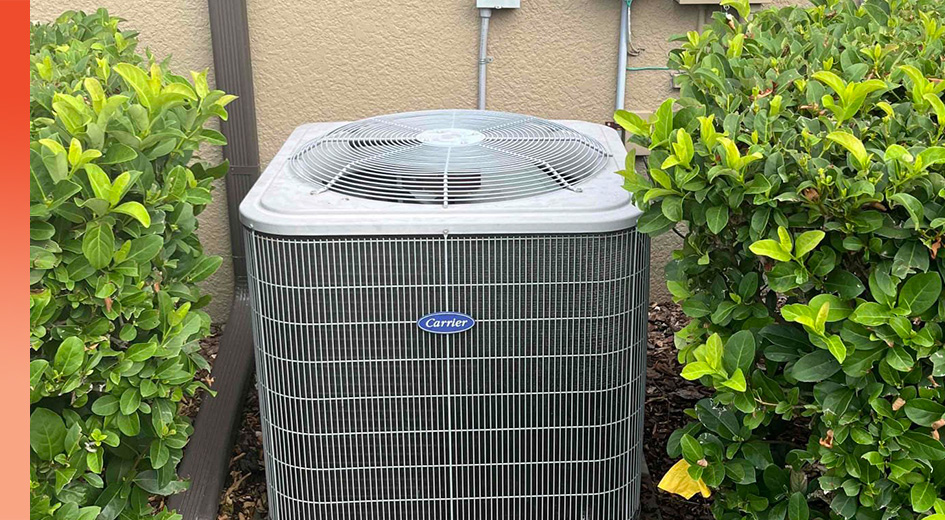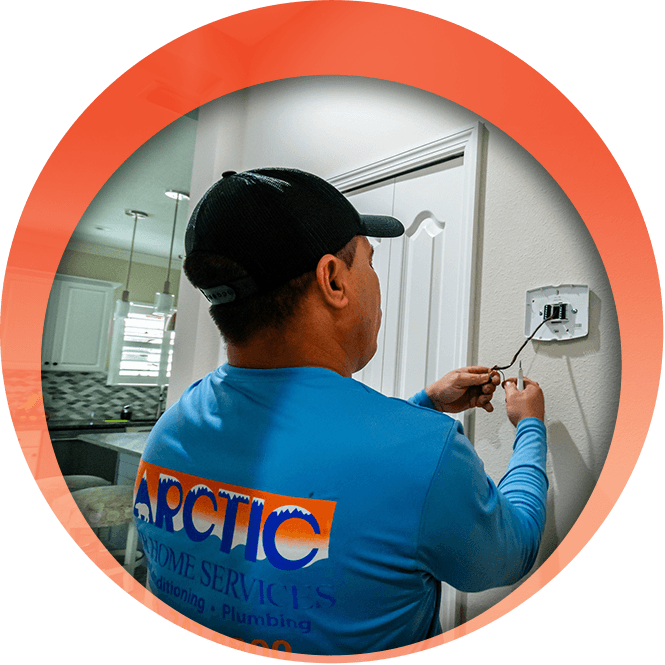
Air Conditioning Maintenance Service in Sarasota
Maximize Your AC's Lifespan and Efficiency in Sarasota
Sarasota's intense heat demands a reliably efficient air conditioning system. From the vibrant downtown area to the serene coastal neighborhoods, maintaining optimal AC performance is crucial for comfort. Residents understand the need for consistent, professional maintenance to avoid costly breakdowns during peak summer months.
With over a decade of service and 30+ years of collective experience, we at Arctic Air Home Services offer comprehensive AC maintenance tailored to Sarasota homes. Our goal is to ensure your system runs smoothly, providing energy-efficient cooling and preventing unexpected issues. We're committed to your comfort and peace of mind.
Investing in regular AC maintenance is a smart way to keep your system in top shape, save money, and stay comfortable all year. Call (941) 283-7532 to schedule air conditioning maintenance in Sarasota, FL, today.
How Often Should I Clean or Replace My Air Filter?
Here in Venice, with our humidity and coastal environment, air filters can get dirty quickly! Your air filter is the first line of defense against dust, pollen, pet dander, and other airborne particles that can diminish your indoor air quality and the efficiency of your HVAC system.
While a general rule of thumb is to replace them every 1-3 months, the ideal frequency depends on several factors:
- Type of Filter: Some filters are designed for longer use than others.
- Household Size: More people and pets mean more airborne particles.
- Indoor Activities: Activities like cooking and renovations can produce a lot of dust and debris.
- Outdoor Air Quality: High pollen counts or nearby construction can impact your indoor air quality.
It's a good idea to visually inspect your air filter monthly. If it looks gray or clogged, it's time for a replacement. You can also check your HVAC system's owner's manual for specific recommendations.
Moreover, ensuring that the right type of filter is used for your specific HVAC system is critical for maintaining optimal air quality and functionality. Investing in high-quality filters can significantly improve filter efficacy, particularly in environments prone to high levels of airborne particles. Discussing options with a professional can help tailor solutions specific to your household's needs.
Keeping your air filter clean can help your system run more efficiently, improve your indoor air quality, and potentially extend the life of your HVAC equipment. If you have any questions or need assistance with air filter replacement, don't hesitate to contact us.
What Does an AC Maintenance Check Involve?
Regular air conditioning maintenance is essential for keeping your system running smoothly and efficiently, especially here in Florida. But what exactly does a professional maintenance check-up involve?
A technician will start by thoroughly inspecting your entire system, inside and out, looking for any signs of wear and tear, damage, or potential problems. This includes checking electrical connections, refrigerant lines, the drain line, and all moving parts. They'll also clean key components like the condenser coils, evaporator coil, and blower fan and replace your air filter to confirm good airflow and indoor air quality.
Refrigerant levels are crucial for proper cooling, so the technician will check those and look for any leaks. They'll also test all the electrical components, like the capacitor, contactor, and relays, to make sure they're working correctly and calibrate your thermostat for accurate temperature readings. Finally, they'll run tests to assess your system's overall performance, checking things like airflow and system pressures.
Beyond basic inspections, a comprehensive maintenance check may also include upgrading system components as needed. Recommendations for upgrades are tailored to enhance performance and efficiency, ensuring that your system is equipped to handle the unique demands of Florida's climate. Discussing these options with your HVAC technician can prevent future issues and optimize comfort and savings long-term.
The Importance of Routine AC Maintenance in Florida
Regular maintenance is an investment that pays off by keeping your AC system in optimal condition, ensuring a comfortable living environment all year long.
Maintaining your air conditioner, especially here in Southwest Florida, is crucial for several reasons:
- Energy Efficiency & Cost Savings: A properly maintained air conditioner operates more efficiently, reduces energy consumption, and lowers your utility bills. Routine maintenance tasks contribute to improved energy efficiency and cost savings in the long run.
- Improved Indoor Air Quality: Florida's hot and humid tropical climate creates an environment conducive to the growth of mold, bacteria, and other contaminants. Regular maintenance includes cleaning or replacing air filters, which helps trap airborne particles, thus improving indoor air quality. It also involves cleaning the evaporator coil, drain pan, and ductwork, reducing the presence of allergens and pollutants.
- Warranty Compliance: Many air conditioner manufacturers require regular maintenance to keep the warranty valid. Following the recommended maintenance schedule ensures that you comply with warranty requirements, protecting your investment and potential coverage for any unexpected AC repairs.
- Extended Lifespan: Regular maintenance helps extend the lifespan of your air conditioner. By identifying and addressing minor issues early on, you can prevent them from turning into major problems that could lead to costly repairs or even premature system failure. A well-maintained unit can serve you for many years, maximizing your investment.
- Reliable Performance: Florida's climate can be unforgiving, with high temperatures and humidity levels. Regular maintenance ensures that your air conditioner is in optimal condition to handle the demands of the climate, reducing the risk of AC breakdowns and ensuring reliable performance when you need it the most.
In addition to these benefits, regular air conditioning maintenance supports environmental sustainability by maintaining system efficiency. Consistently efficient systems use less energy, thus reducing overall environmental impact. Committing to routine maintenance not only elevates home comfort but also contributes to broader energy conservation efforts.
The Impact of Salt Air on AC Units
For residents near the coast, salt air corrosion is a significant concern for air conditioning systems. Salt can accelerate the corrosion process on the metal components of your AC unit, compromising its efficiency and leading to potential failures. To combat this, consider having your system coated with anti-corrosive treatments and maintained regularly.
Regular cleaning to remove salt deposits and vegetation around the outdoor unit is necessary to prevent corrosion and maintain airflow. Discussing protective measures with your HVAC technician can extend the life of your AC unit and reduce unexpected breakdowns linked to salty sea air. Fortifying your system with the right materials and consistent upkeep safeguards your investment against the unique stresses of a coastal environment.
Save Money with Our Air Conditioning Maintenance Plans
Want to keep your AC running smoothly and efficiently while saving money in the long run? Investing in regular maintenance can help you do just that. Scheduled tune-ups can help reduce energy costs, prevent unexpected breakdowns, and keep your system operating at its best.
Here at Arctic Air Home Services, we offer maintenance plans designed to give your AC the care it needs.
Here's how our plans can help:
- Professional Expertise: We recommend scheduling professional maintenance at least once a year. Our trained HVAC technicians can thoroughly inspect your system, clean key components, and optimize performance. This can help identify potential issues before they become major problems, saving you money on costly repairs down the road.
- Heavy Use Considerations: If your AC works overtime during those scorching Florida summers, more frequent maintenance may be beneficial. This can help your system handle the increased demand and stay in top condition.
- Manufacturer Recommendations: We always consult the manufacturer's guidelines for your specific AC model and follow their recommended maintenance schedule and procedures.
Our maintenance plans offer a proactive approach to cooling care, helping you avoid unexpected expenses, extend the life of your system, and enjoy consistent home comfort.
Why Choose Us for Air Conditioning Maintenance Services in Sarasota
Choosing the right team for your air conditioning maintenance is vital for ensuring your comfort and the longevity of your system. At Arctic Air Home Services, we understand the unique climate challenges Sarasota residents face, and we're dedicated to providing exceptional service that exceeds expectations. Here's why you should trust us with your AC maintenance needs:
- Decades of Expertise: Our team brings over 30 years of combined experience, ensuring thorough and knowledgeable service. We've seen it all, and we know how to keep your AC running its best.
- Comprehensive Maintenance: We go beyond basic tune-ups, offering detailed inspections and preventative care to identify and address potential issues before they escalate.
- Tailored Solutions: We understand that every home is different. We customize our maintenance plans to meet your specific needs, maximizing efficiency and performance.
- Transparent Pricing: We believe in honest and upfront pricing. You'll know exactly what to expect, with no hidden fees or surprises.
- Commitment to Energy Efficiency: Our maintenance services focus on optimizing your AC's performance, helping you save on energy bills and reduce your environmental footprint.
- 100% Satisfaction Guarantee: We stand behind our work. Your satisfaction is our priority, and we're committed to ensuring you're completely happy with our service.
- Prompt and Reliable Service: We value your time. Our team is dedicated to providing timely and efficient service, minimizing disruptions to your daily life.
We're not just maintaining your AC; we're building lasting relationships with our Sarasota community. Our commitment to excellence and customer satisfaction sets us apart, making us the trusted choice for air conditioning maintenance.
For expert air conditioning maintenance solutions in Sarasota, call us at (941) 283-7532 or contact us online today!

See What Your Neighbors Say About Us
Your Comfort Is Our Priority!
-
 "Highly Recommend!!"
"Highly Recommend!!"Very happy with Arctic Air, they do both plumbing and HVAC services and have regular service inspection plans. The team members that have come are always friendly and more than willing to answer my questions and explain what is being done.
- John S. -
 "Great job!"
"Great job!"We had some major repairs and our tech did an excellent job of explaining the issue and the best approach to fix each problem. He was very nice, professional then explained all he done and all of the numbers on his meter to confirm the problems were resolv
- Jay B. -
 "Definitely will be using them for future maintenance."
"Definitely will be using them for future maintenance."Amazing response time. Great customer service. Samuel was very efficient in his work. Techs are very knowledgeable and found and fixed the issues promptly.
- Corey O. -
 "He’s that good!"
"He’s that good!"Pedro was fantastic! He did a perfect job! Explained everything about our new heat pump (new to us, 5 years an old) and was knowledgeable and a real professional. My advice after 40 years of hiring and supervising employees is to give this young man a rais
- Fred P. -
 "Thanks again for the terrific service, Chris!"
"Thanks again for the terrific service, Chris!"Chris serviced our hvac system and perfectly communicated his arrival time and was superbly professional and friendly. Also very knowledgeable with the servicing of our unit, Chris took the time to explain certain things and issues to watch out for as the
- Mark P. -
 "Great service, great people—highly recommend!"
"Great service, great people—highly recommend!"Mathew McCrobie and the team at Arctic Air are amazing! Super knowledgeable, honest, and always go the extra mile to make sure everything is done right. It’s hard to find a company you can truly trust, but these guys are the real deal. Great service,
- Ryan R, -
 "Thank you Artic Air!!!"
"Thank you Artic Air!!!"We had a whole new system installed today and couldn’t be more happy with the service we have received from Artic Air! The team today was extremely professional and knowledgeable and was happy to answer our questions and kept us updated on their prog
- Donnie O. -
 "Paul was terrific."
"Paul was terrific."Very professional and great follow up. Parts were needed and ordered and the follow up appointment for installation was scheduled without us needing to ask. Very polite and speedy.
- Murray S.


